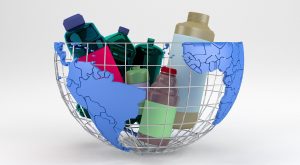Recycling is key to establishing a more sustainable production and consumption model. This is revealed by the Organization for Economic Co-operation and Development (OECD) in its report ‘Policy brief on making the most of the social economy’s contribution to the circular economy’, where it underlines the importance of recycling within the European Circular Economy strategy and as a driver of significant social and economic benefits.
The OECD is therefore committed to implementing measures to stimulate the social economy in the future, not only to improve the lives of the population from a sustainability standpoint, but also to increase its wealth and business productivity.
Synergies generated by recycling
The report highlights the growth potential of industries that, directly or indirectly, work within the social economy. Recycling fosters the development of circular activities, makes the ecological transition more inclusive, favors collaborative models and practices between companies from different sectors, improves the acceptance of green technologies by the population and promotes, in general, a more circular behavior of society through increased education on sustainability.
According to data from the international non-profit network representing social enterprises active in the field of reuse, repair and recycling (RREUSE), social enterprises generate between 40 and 100 jobs for every 1,000 tons of material collected and recovered for reuse-oriented activities. In this regard, the OECD report states that if companies working in the recycling industry manage to strengthen their synergies and collaboration with institutional initiatives of a social and circular nature in the coming years, the positive impact on the economy and on employment will increase even further.
To achieve this, the document invites both the public and private sector recycling industries to define common objectives, align policy priorities that benefit citizens, and enable partnerships between the different actors involved in the circular economy value chain. To make these initiatives as successful as possible, it is critical to actively work on removing barriers accessing the waste stream and second-hand goods, ensuring that financial instruments are available to social enterprises regardless of size and legal form, and supporting training and job placement through skills certification programs.
Other proposals include improving research and analysis of recycling data, strengthening innovation mechanisms and access to financing, and ensuring that the public sector takes a step forward to establish disruptive pilot projects on recycling that have a high potential for innovation.
In this regard, it is worth highlighting the example of companies such as REPETCO, which has been able to develop its own patented, nature-friendly system for multilayer PET/PE food packaging. By means of a unique process, rPET pellets and rPET are generated that can be reused in the food industry with multilayer PET/PE trays and sheet packaging; in bottles for soft drinks or detergents; and in fibers for the textile and automotive industry.
Increased collaboration with the public sector and greater access to innovation are key to recycling of the future
European challenges on plastic recycling
The real implementation of a Circular Economy strategy in Europe is one of the great challenges that have been set in recent years by EU institutions. The main document on this initiative is the ‘European Strategy for Plastics in a Circular Economy’, presented by the European Commission in 2018, and where the commitment is established that, by 2030, plastic recycling on the continent will be a profitable industry.
Among other milestones, there is the challenge that by 2025, 65% of plastic packaging in the European Union will be recycled and 25% of rPET will be included in bottles. By 2030, the challenge is to make all plastic packaging on the market 100% recyclable.
Other articles of interest: What will the European Circular Economy strategy mean for rPET packaging?







